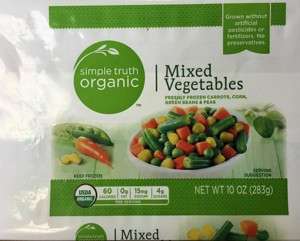March 11, 2017
Originally posted in March 2017, updated in May 2020 with even more awesomeness.
Eating on a budget can be easy, delicious, and nutritious. Here’s how!

People often cringe over the perceived extra cost of eating healthy—especially when on a budget. Organic foods, fresh produce, and quality meats can quickly add up. But with a little advance planning, you can be frugal and maintain clean healthy eating at the same time. It all starts in your kitchen.
1. KEEP YOUR KITCHEN ORGANIZED
Before you go to the grocery store, try to organize your fridge, drawers, cabinets, and anywhere else you store your food in the kitchen. By doing this you can visualize what you really need. This will help you prepare a shopping list that includes only the ingredients you require so you don’t get swept up in the sales and shiny labels at the store!
2. MEAL PLANNING
Another good idea for eating on a budget is to make a meal plan. This means planning in advance the specific meals and snacks (as well as portion sizes) that you’ll have for the upcoming week. Be sure to include any others you’re cooking for, too.
Meal planning is inarguably one of the best strategies to help you stick to desired healthy eating. It serves as accountability to maintain serving sizes—hey, there’s no overeating when you’ve only prepared what you need!
Meal planning also gives you purpose in the grocery store. It helps to keep you on track with your budget while also keeping your waistline in check!
3. COLLECT COUPONS
The next step is to check out flyers, coupons, and websites for deals. Nowadays you can easily download some apps to your smartphone for free like Flipp, save.com, etc. These apps also compare the prices between stores.
Even though you’ve already meal planned for the week, you can make minor substitutions to your meal plan and shopping list according to the foods that are on sale. If you had planned on green beans with Tuesday’s dinner, for example, but broccoli is on sale and beans are not, you can substitute with broccoli for this week instead. You’re still getting your greens, plus saving a little money.
Pro Tip: Get the kids involved—they love checking out flyers! You not only get some help with this task, but you’re also teaching them about the value of a dollar!
4. BUY IN BULK
Consider buying things in bulk when available and on sale. Look for those items when you go for groceries. If blueberries are on sale by the case, buy a couple of cases and freeze them in smaller, individual-sized containers for later use. Vegetables freeze well, too.
You could also try planning the day and time of your grocery excursions. Some supermarkets might have specific sale days or reduced items in the evening. For example, some grocery stores offer 15 percent off every first Tuesday of the month. Likewise, summer markets will often drastically reduce prices in the last couple hours of a Sunday.
5. BUY IN SEASON

When it’s possible, buying foods that are in season can be cheaper. These are often the foods you’ll see going on sale as we mentioned above. When there is an abundance of something because it’s harvest season, we tend to see lower prices.
In some Canadian cities where we have snow and below zero temperatures for several months of the winter, buying local and in-season can be a challenge. But frozen veggies and fruits are a very good alternative, as they are usually frozen from fresh with no added ingredients, and they retain their nutritional value.
.
6. CHOOSE GENERIC BRANDS
You might also consider some less expensive and generic brands. Most often there is no difference whatsoever in ingredients or quality (read the labels). This can be an easy way to save a little here and there. Hey, it all adds up!
7. CONSIDER MORE BUDGET-FRIENDLY PROTEIN OPTIONS
Meat can be costly, especially grass-fed and organic meats. Alternative sources of clean protein are the plant-based proteins like nuts, tofu, beans, lentils, and other legumes. Check out our article on plant-based eating where you can download your FREE guide to the Top 15 Plant-based High Protein foods.
8. KNOW WHERE IT’S WORTH SPENDING THE EXTRA $$
There’s no denying that organic foods come with benefits. But when you’re eating on a budget, are the benefits worth the extra cost? You might be worried that you’re needlessly throwing your money away to buy organic foods that really don’t make that much difference in food quality. . . and you might be right on some foods.
Which ones are more “worth it” than others? We have the answers for your organic food budget here.
9. BE A MULTI-TASKING, MEAL-PREPPING, MONEY-SAVING STAR!
Once you’re home from the grocery store, become a multitasking, meal prepping, money-saving hero with these kitchen tips:
- Chop extra fruits and vegetables so they’re ready for lunches, snacks, and meals the next day.
- Save the water from boiling veggies for use in soups or stews, or to use in smoothies. This water has many nutrients that have been leached out from the vegetables.
- Save run-off liquid from cooking mushrooms for use in a sauce or soup.
- When buying in bulk, you can transform a lot of tomatoes into a tomato sauce and freeze it. When green onions or celery are on sale, buy a bunch. Chop it up and put in sandwich baggies to be pulled out of the freezer for use in soups and such later on.
- Cook twice the chicken or ground beef you need and either keep extras in the fridge to make chicken salad, chili, and spaghetti sauce the next day or freeze them for later. I even freeze whole baked chicken breasts and am delighted that they have the same great taste and texture when thawed out.
- Finally, cook on the weekend (or during your days off). You can freeze meals for the upcoming week like soups, stews, casseroles, pasta dishes, chili, and yes even chicken breasts! These will come in handy, especially on busy days.
10. USE THOSE LEFTOVERS!
- Reorganize your fridge regularly. Try to keep items that are quick to spoil in plain sight instead of hidden in the back or tucked away in drawers.
- Prepare casseroles, wraps or salads from potatoes, pasta and rice leftovers. You can also transform these into soups and desserts.
- Transform vegetable leftovers to a pureed soup.
- Prepare a day-old roast chicken or turkey breast on a green salad with some combination of vegetables, chickpeas, trail mix, berries, and some cheese.
- Leftover cooked grains (quinoa, rice) are a good, nutritious, and filling addition to any soup or wrap.
- Organize your kitchen (fridge and pantry) so you know what you already have and what you need.
- Meal plan in advance for the upcoming week, along with portion sizes you’ll need.
- Check out flyers or coupons and make substitutions when possible.
- Buy in bulk when items are on sale. Freeze items for later use.
- Buy in season when possible.
- Choose generic brands.
- Try some lower-priced plant-based proteins.
- Choose organic foods wisely.
- Use a variety of tricks in the kitchen to be a multi-tasker and save money.
- Use leftovers efficiently.
DID YOU KNOW?
All of our MEAL PLANS come with a staple grocery list – this helps you know exactly what to buy so you can reduce food waste and make clean eating work for your budget.
10 Tips for Eating on a Budget
The entire contents of this website are based upon the opinions of Build Holistic Nutrition. Please note that Build Nutrition is not a dietitian, physician, pharmacist or other licensed healthcare professional. The information on this website is NOT intended as medical advice, nor is it intended to replace the care of a qualified health care professional. This content is not intended to diagnose or treat any diseases. Always consult with your primary care physician or licensed healthcare provider for all diagnosis and treatment of any diseases or conditions, for medications or medical advice, as well as before changing your health care regimen.
© BUILD NUTRITION 2026. ALL RIGHTS RESERVED. PRIVACY POLICY
Go ahead, creep us on social. You know you want to!
